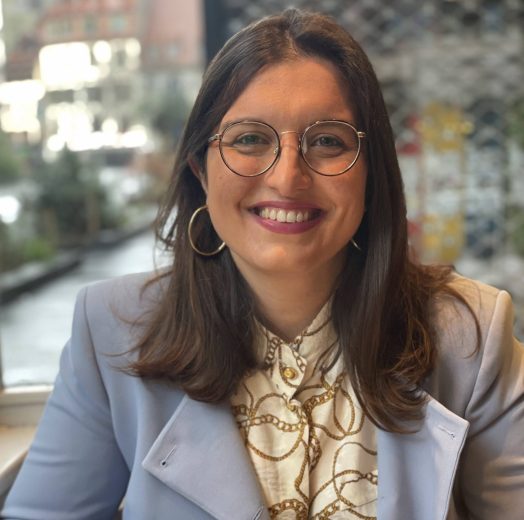
Dr. Karina Pombo-Garcia has joined us in February as a new group leader at the Rosalind Franklin Institute.
The Pombo-Garcia lab will investigate the molecular assembly of cell interfaces in the epithelial tissue and in pathology of intestinal diseases. Combining cell biology, biophysics and chemical biology Karina aims to uncover how cells control the different physico-chemical environments to drive self-organisation processes that shape mesoscale structures enabling tissue function.
By better understanding the subcellular organisation using advance microscopy, including super-resolution STED (Stimulated Emission Depletion), she hopes to get novel mechanistic insights into cell-cell communication at the interface, which will uncover novel therapeutic avenues for diseases linked to dysfunctional junctions such as after inflammation, infection or gastric cancer.
When asked why she chose to join the Franklin, Karina said, “The cutting-edge technology under development at the Franklin, alongside the brilliant scientists leading these projects were a big attraction to me.”
“Also, as a relatively new institute, I felt there would be scope for me to help shape the scientific culture of the Franklin, which was appealing to me.”
When asked how her work would help make the Franklin’s vision a reality, Karina said, “I think I am a good fit at the Franklin because I bridge the technology to the biomedical application.
“I am interested and trained on working at the interface of different disciplines physics, chemistry and biology which is intrinsic to the Franklin. I am excited to contribute to the next step of the Franklin bringing the cutting-edge technologies to uncover biological questions to impact human health.”
Joining us from the Max Planck Institute for Molecular Cell Biology and Genetics (MPI-CBG) in Dresden, where Karina was a postdoc with Professors Honigmann and Hyman. Working at the interface of biophysics, cell biology and biochemistry, she made a key discovery on the understanding the process by which epithelial cells connect via wetting of liquid-condensates of tight junctions.
Prior to this, she completed her PhD in Chemistry between Helmholtz (HZDR), Technische Universität Dresden (TUD), Germany and Monash University, Australia, on development of radiopharmaceuticals and nanomaterials for molecular imaging for early cancer diagnosis. It was during this time that she first became interested in super-resolution imaging and finding ways to push the technology further.
During her first year at the Franklin, Karina hopes to concentrate on building her lab, not only terms of getting experiments up and running, but growing her team. She already has her first two PhD students from the latest cohort of Franklin PhD students, who are just beginning to get their projects underway, and she is recruiting a Postdoc and Lab technician. If you are interested in super-resolution microscopy, quantitative bioimaging, biophysics, chemical biology, gut-organoids & biomolecular condensates, look out for the job adverts which will be posted soon or get in touch with Karina!
Karina is already off to a flying start, and we look forward to bringing you more updates on her work in the coming year.